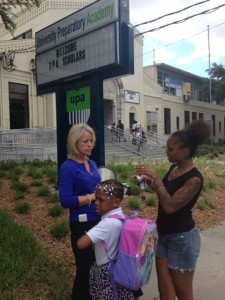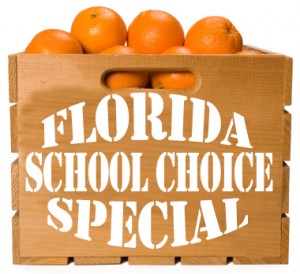
University Preparatory Academy leader Cheri Shannon talks to a parent after school recently in St. Petersburg, Fla. For many families, the school offers them hope that their child can get a good education.
It took only one meeting to convince Zanquesha Morgan to enroll her two boys into University Preparatory Academy, a new K-8 charter school in south St. Petersburg, Fla. It didn’t matter that she had never heard of the school, or its founder, or its approach to academics.
Like a lot of parents in this hardscrabble community along Dr. Martin Luther King Jr. Street, Morgan was desperate. Four district schools in the predominantly black area earned F grades this year. Three more would have had it not been for a last-minute rule change by the state.
“I just knew I wanted another option,” Morgan said. “I came to the orientation and I was like, ‘Finally, someone has answered our prayers.’ ’’
What’s happening in this city of 280,000 on the west coast of Florida, better known for its sunshine, retirees and the Tampa Bay Rays baseball team, echoes what’s happening across the nation. Charter schools continue to grow enrollment by leaps and bounds because parents are lining up in droves, sometimes literally. In the case of University Prep, more than 800 applied, but because of capacity, only 530 got in.
According to a recent estimate from the National Alliance for Public Charter Schools, 520,000 individual students were on charter school waiting lists last year – on top of the 2.3 million enrolled. As the situation in Florida shows, many parents are willing to roll the dice on an untested charter school because they’re so frustrated with existing options.
“I figured it’s got to be better than the public school,” said Timothy Gill, who brought his son and daughter to UPA after years at a nearby, F-rated district school. “Here, there’s less bullying and more education.”

Parent Timothy Gill enrolled his daughter and son in University Prep Academy because he liked the curriculum, and because he wanted them to feel safe.
The school’s founder and principal is Cheri Shannon, the former president and chief executive officer of the Florida Charter School Alliance. She modeled University Prep after a charter she headed in Kansas City, Mo., that aimed to prepare low-income minority students for college.
“It’s something that’s never been here before,’’ said Enoris Sly, a city worker who moved his 7-year-old daughter, Anoriay, from a private Christian school to UPA.
He came for the promise of rigorous curriculum, highly-skilled teachers and all the extras – Spanish, music, art, P.E. And because he could get all of that for free. Charter schools are public schools that operate independently from districts.
The head of one of Florida’s two statewide charter school support groups is stepping down to lead a more targeted effort. Cheri Shannon, president and CEO of the Florida Charter School Alliance, is leaving at the end of the month to lead University Prep, a new charter network she says will focus exclusively on low-income students. To some extent, she’ll be coming full circle, having once run a charter school in Kansas City, Mo., that served students who were predominantly black and high poverty.
“This is my passion, my mission. ... I felt called, for lack of a better word, to come back in and do that work,” Shannon told redefinED. “This is where I want to end my career, making a difference in the lives of kids who deserve a difference.”
Shannon joined the alliance in April 2011 as its founding CEO. A former associate superintendent in the Kansas City school district, she has years of experience in both traditional school districts and the charter sector.
Her new venture already has four charter school proposals in the pipeline, including one scheduled to go before the Pinellas County School Board on Tuesday. The school boards in Broward and Palm Beach counties have already signed off on the University Prep applications in their districts. The application in Hillsborough is scheduled to go before that district’s board next month, Shannon said.
The Pinellas proposal is for a K-8 school in St. Petersburg with a projected, first-year enrollment of 694 students. The plan is to open next fall. (To read more about the application, go to page 318 of the school board agenda packet.)
The proposal stands before an interesting legal backdrop - a 2010 settlement from a class-action lawsuit that accused the Pinellas district of failing to educate black students in violation of the state constitution. Under its terms, the Pinellas school board set an aspirational goal of having at least 500 spaces in charter schools available for black students. (more…)
When Florida Gov. Rick Scott unveiled his education agenda last week, he threw out a potentially far-reaching idea: Allowing districts to open their own charter schools.
The proposal could address a common complaint among traditional school districts - that federal and state bureaucracies prevent their schools from being as innovative as charter schools. But how would these District Charter Innovation Schools, as Scott called them, actually work? Would they truly be as flexible as independent charter schools?
We’re waiting to hear more. Scott didn’t spell out specifics, beyond saying the schools would operate with the same funding levels as other charter schools. His press secretary, Jackie Schutz, told redefinED she couldn’t provide any more details.
In the meantime, there may be clues in the handful of district-run charter schools that already have been approved by the state Department of Education. They don’t look like typical charter schools. But in some respects, they do veer from the framework of more traditional public schools.
The Academy for International Education Charter School in Miami Springs is a year-old “hybrid’’ school that offers a curriculum based on magnet and charter school programs, with students learning second and third languages.
The principal is a 30-year district employee who left the traditional public realm for the charter. The academy has a nonprofit board that is technically independent from the district, but has contracted with the Miami-Dade district for services, including custodial and cafeteria workers. The school also leases space from the district, significantly reducing facility expenses. Miami-Dade district and school officials did not return calls for comment.
In Polk County, DOE approved another district-run, charter endeavor, Step Up Academy, in August. (more…)
School district officials and state lawmakers aren’t the only ones outraged by a failing Orlando charter school that cut its principal a check, as it was closing its doors, for half a million dollars.
“This is totally unacceptable,’’ Cheri Shannon, president and chief executive officer of the Florida Charter School Alliance, told redefinED Friday.
Added Lynn Norman-Teck of the Florida Consortium of Public Charter Schools, in a prepared release: “The alleged behavior of NorthStar is the exception, not the rule. There are many examples of public charter schools, their governing boards, and administrators, with exemplary records.’’
The Orlando Sentinel reported Thursday that NorthStar High School’s board of directors paid Principal Kelly Young $519,453.36 in taxpayer dollars. The lump-sum payment occurred two days after the Orange County School Board accepted the school’s plan to close instead of being shut down by the district for poor performance.
The principal’s payout was based on a contract that paid her $305,000 a year through 2014, even though the school’s contract with the district was up for renewal in 2012, the Sentinel reported. In addition, the charter school is still paying Young $8,700 bi-monthly to oversee the school’s shutdown, the newspaper wrote.
The story has stoked criticism of charter schools, which receive public money but are run by private boards. And it comes at a sensitive time. Charter schools in Florida served 180,000 students last year and are expected to enroll twice that many by fall 2017. Proponents, including Gov. Rick Scott, are pushing for even greater expansion. (more…)
by Cheri Shannon
In an effort to transform our public school system, charter schools have provided a breath of fresh air. Free, open-enrollment public schools, charters were established in Florida in 1996 to provide more high-quality educational options for families. With the flexibility to innovate with curriculum, classroom time, technology and much more, charter schools are held to greater standards of accountability for student achievement. This means that charter schools that are effectively improving learning, as most in Florida are, should be celebrated as well as replicated so more students benefit.
However, if a charter school is not living up to its mission of providing a high-quality education for its students, then it should no longer be in operation. All public schools, whether a charter, magnet or district school, must ensure that every child has access to a strong educational program that meets his or her needs.
Since the first charter school opened 20 years ago in Minneapolis, we have learned that, occasionally, opening the door to let in fresh air brings with it some flies. Despite the strong performance of charter schools, there are a few underperformers that fall short of their mission to provide a high-quality education for all students. That is why local school boards and the Department of Education have moved to close at least three charter schools this year – actions we in the larger charter school movement support. The most recent action includes the decision to close Life Force Arts and Technology charter in Pinellas County, which had questionable curriculum and management, and to no one’s surprise, low student achievement. When charter schools like these do not meet their goals, they should no longer have the privilege of serving students and should close.
As we continue to hold charter schools accountable, as we should all public schools, we must not lose sight of the fact that parents of nearly 180,000 students actively chose to send their children there.
In the case of some poor performers, it’s perhaps because parents feel their child is safer in a small environment the school may provide, or because the nearby district schools are worse off. But those factors alone are not enough. Charter schools must be able to demonstrate the ability to improve learning, and when bad ones close, we should respect parents’ choices and work to ensure good schools will take their place. Parents will ultimately make good choices – they simply need access to more of them. (more…)